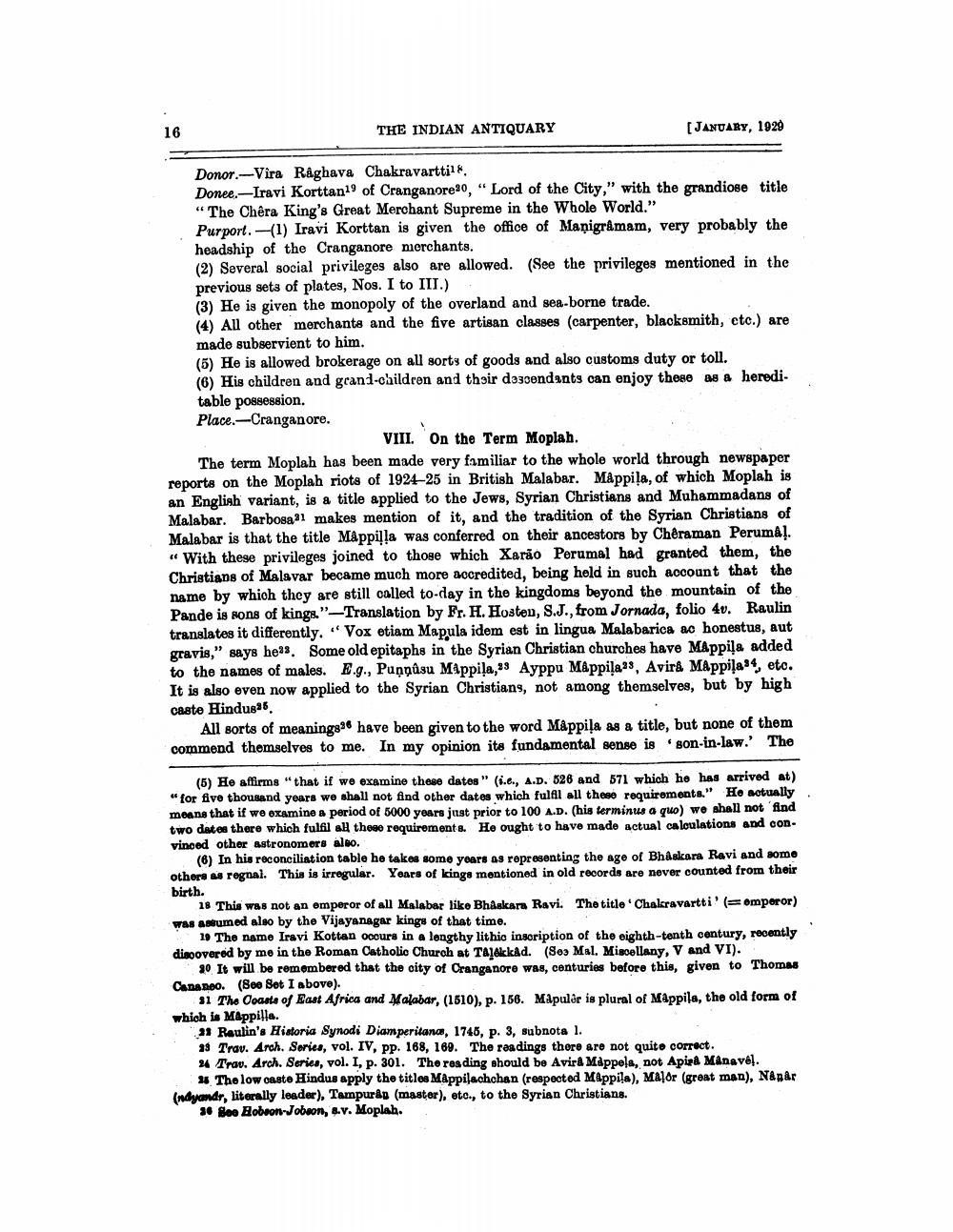________________
16
THE INDIAN ANTIQUARY
[ JANUARY, 1929
Donor.-Vira Raghava Chakravartti1.
Donee.-Iravi Korttan19 of Cranganore 30, "Lord of the City," with the grandiose title "The Chêra King's Great Merchant Supreme in the Whole World."
Purport.(1) Iravi Korttan is given the office of Manigramam, very probably the headship of the Cranganore merchants.
(2) Several social privileges also are allowed. (See the privileges mentioned in the previous sets of plates, Nos. I to III.)
(3) He is given the monopoly of the overland and sea-borne trade.
(4) All other merchants and the five artisan classes (carpenter, blacksmith, etc.) are made subservient to him.
(5) He is allowed brokerage on all sorts of goods and also customs duty or toll.
(6) His children and grand-children and their descendants can enjoy these as a hereditable possession. Place.-Cranganore.
VIII. On the Term Moplah.
The term Moplah has been made very familiar to the whole world through newspaper reports on the Moplah riots of 1924-25 in British Malabar. Mappila, of which Moplah is an English variant, is a title applied to the Jews, Syrian Christians and Muhammadans of Malabar. Barbosa21 makes mention of it, and the tradition of the Syrian Christians of Malabar is that the title Mappilla was conferred on their ancestors by Chêraman Perumal. "With these privileges joined to those which Xarão Perumal had granted them, the Christians of Malavar became much more accredited, being held in such account that the name by which they are still called to-day in the kingdoms beyond the mountain of the Pande is sons of kings."-Translation by Fr. H. Hosten, S.J., from Jornada, folio 4v. Raulin translates it differently. "Vox etiam Mapula idem est in lingua Malabarica ac honestus, aut gravis," says he33. Some old epitaphs in the Syrian Christian churches have Mappila added to the names of males. E.g., Punnûsu Mappila,33 Ayppu Mappilas, Avira Mappila34, etc. It is also even now applied to the Syrian Christians, not among themselves, but by high caste Hindus36.
All sorts of meanings36 have been given to the word Mappila as a title, but none of them commend themselves to me. In my opinion its fundamental sense is son-in-law.' The
"
(5) He affirms "that if we examine these dates" (i.e., A.D. 526 and 571 which he has arrived at) "for five thousand years we shall not find other dates which fulfil all these requirements." He actually means that if we examine a period of 5000 years just prior to 100 A.D. (his terminus a quo) we shall not find two dates there which fulfil all these requirements. He ought to have made actual calculations and convinced other astronomers also.
(6) In his reconciliation table he takes some years as representing the age of Bhaskara Ravi and some others as regnal. This is irregular. Years of kings mentioned in old records are never counted from their birth.
18 This was not an emperor of all Malabar like Bhaskara Ravi. The title' Chakravartti' (emperor) was assumed also by the Vijayanagar kings of that time.
19 The name Iravi Kottan occurs in a lengthy lithic inscription of the eighth-tenth century, recently discovered by me in the Roman Catholic Church at Talakkad. (See Mal. Miscellany, V and VI).
30 It will be remembered that the city of Cranganore was, centuries before this, given to Thomas Cananeo. (See Set I above).
31 The Coasts of East Africa and Malabar, (1510), p. 156. Mapulêr is plural of Mappila, the old form of which is Mappilla.
21 Raulin's Historia Synodi Diamperitanas, 1745, p. 3, subnota 1.
23 Trav. Arch. Series, vol. IV, pp. 168, 169. The readings there are not quite correct.
24 Trav. Arch. Series, vol. I, p. 301. The reading should be Avira Mappela, not Apira Manavél.
15 The low caste Hindus apply the titles Mappilachchan (respected Mappila), Malor (great man), Nånår (ndyandr, literally leader), Tampuran (master), etc., to the Syrian Christians.
36 Bee Hobson-Jobson, s.v. Moplah.




